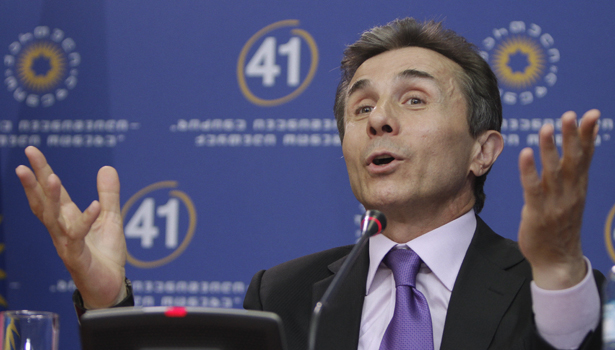
Electoral Democracy: Path to State Capture in Georgia
Publication: Eurasia Daily Monitor Volume: 10 Issue: 48
By:

In October 2012, Georgia held the freest parliamentary elections in the country’s two decades of experience with competitive multi-party politics. Also for the first time, the opposition defeated the government, in a contest on a “level playing field.” This, however, was not simply a competition of political programs, as could have been the case in a fully institutionalized democracy. In Georgia, these elections involved a parallel contest between the government’s administrative resources and the Russian-made billionaire Bidzina Ivanishvili’s private resources, equal to one half of Georgia’s annual GDP. Ivanishvili applied his resources successfully toward regime change and, in effect, a personal capture of the state (see EDM, March 8).
That turned out to be a two-phased process, in which Ivanishvili advanced toward state capture via coalition purchase. Around his own Georgian Dream party he built a namesake coalition of five small parties, financing their campaigns and lifting them into parliament on his coattails. But he also removed many uncontrollable opposition factions from the political landscape by withholding his support from them, thereby re-channeling their voters toward the Georgian Dream coalition of parties he funded. Georgian Dream is a proprietary party, and the small coalition parties are in much the same situation insofar as they depend on Ivanishvili’s financing and decisions. Thus, Ivanishvili established complete control over the opposition before going on to take control of state power. All this could be seen clearly as Ivanishvili’s power bid unfolded (see EDM, March 13, 2012; July 24, 2012).
President Mikheil Saakashvili’s United National Movement (UNM) and Ivanishvili’s Georgian Dream represented contrasting values and appealed to contrasting sets of expectations among voters. Western observers, fixated on the rival leaders’ personalities and the technical electoral “process,” largely overlooked the essential difference between the two political forces. Ivanishvili’s Georgian Dream represented a backlash from large parts of traditional society (the “profound Georgia,” as well as past elite groups) against the Saakashvili government’s fast-paced liberalization and modernization of the country.
Georgian Dream’s victory, however, does not necessarily vindicate the anti-reform backlash. The outcome could easily, if narrowly, have turned in the UNM’s favor, had it not been for the prison torture tapes (Civil Georgia, September 22, 26, 2012), created and aired by the Georgian Dream campaign in a masterfully timed operation 12 days ahead of election day.
The governing UNM campaigned on its record of overcoming Georgia’s once-rampant crime and corruption; achieving robust economic growth (despite the effects of the Russian invasion and the continuing global crisis); rapidly developing modern infrastructure; attracting foreign investments to Georgia’s open, neo-liberal economy; and embracing cultural Westernization and globalization (warts and all). Georgia climbed spectacularly in the world ratings on ease-of-doing-business, civil service integrity, investment-friendliness and other enablers of economic take-off during the Saakashvili years.
Those policies had significantly reduced, but still far from overcome structural poverty and high unemployment in Georgia. The UNM sought its third legislative mandate as the party of economic modernization and social transformation, driving these processes from the top, in a society still largely bound by traditions. The fast pace and legal shortcuts of these processes were disparaged as “Bolshevism” by fatigued spectator-critics who had themselves matured in the Communist Party of the Soviet Union (CPSU).
Ivanishvili’s coalition appealed to masses of voters who had not yet benefited from economic growth, or actually lost livelihood and status in the transition from state-socialism and paternalist arrangements toward a modernizing society. Ivanishvili is known for generously funding philanthropic programs, including a welfare system in his small native district. Many voters among the uneducated poor hoped to see some of that system extended to the rest of the country. Ivanishvili’s electoral campaign inspired expectations that he might subsidize consumption or price cuts in goods and services from his own funds, if he took over power. He also talked vaguely about creating a $1 billion agriculture support fund. During the campaign, he seemed to hint at all those possibilities or allowed his message to be interpreted to that effect.
Only two political forces entered parliament from these intensely polarized elections. Georgian Dream won 85 seats versus the UNM’s 65 seats in the 150-seat parliament. Since the elections, however, the new authorities have induced or pressured at least ten UNM deputies to defect. Ivanishvili’s personal rating, however, has since risen to 80 percent among Georgian voters (see EDM, February 14). As prime minister, he has already decreed price cuts in some public services and salary increases across the board, at state expense.
To a large extent, these elections involved a choice between a liberal and a paternalist model of society. Georgian voters faced this choice for the first time in a free election. A mass of impoverished, uneducated voters helped skew the outcome in the multi-billionaire’s favor. This outcome may be seen as a case of “electoral democracy” of the illiberal variety, and by the same token a case of populism of the plutocratic variety. It has made Ivanishvili into a democratically elected, popularly acclaimed ruler, with naive expectations pinned on him as resource distributor and provider.




